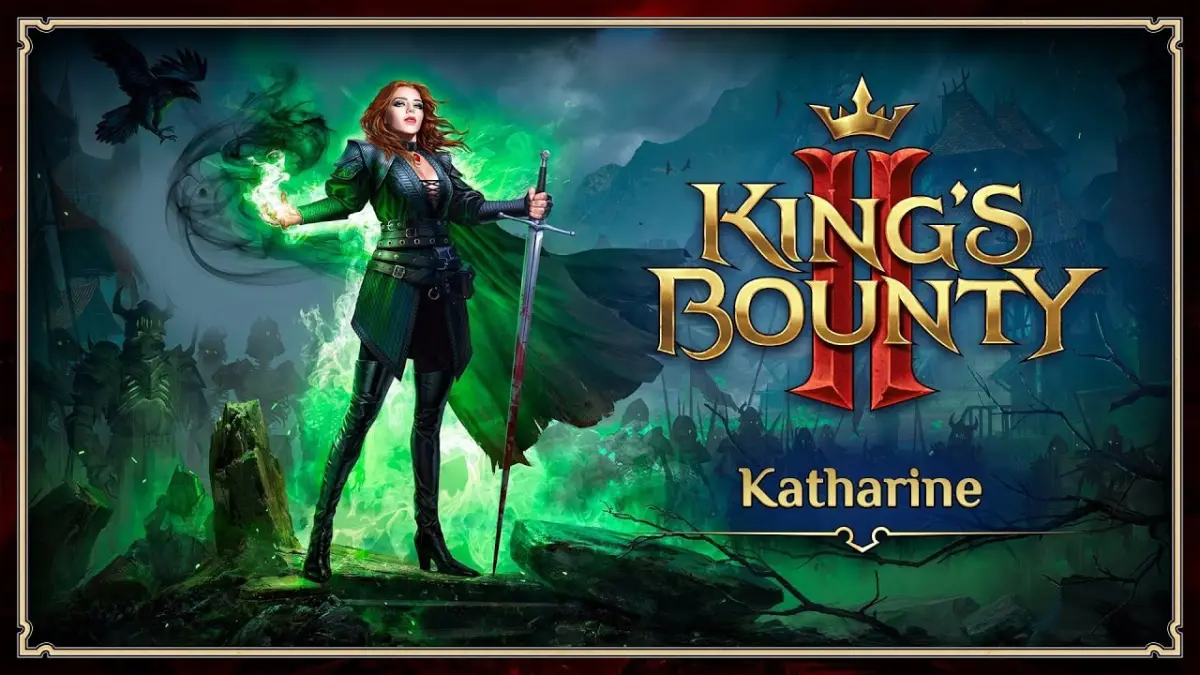So many medieval fantasy stories recycle the same themes and ideas to a frustrating degree and blend into a generic blob of tropes. In order for the genre to appeal to me, it needs to offer something extra to latch onto, be that the immersive gameplay of something like The Elder Scrolls V: Skyrim or the Nemesis system in Middle-earth: Shadow of Mordor. In the case of King’s Bounty II, the thing that hooked me was the sassy attitude of Katharine the mage.
Katharine is one of three characters you can select as your hero in King’s Bounty II, but even her initial bio makes clear that she’d rather be doing something else. She’s the countess of a land called Rigurn but has spent several years away researching magical artifacts and traveling the world. Katharine only ends up at the site where the events of King’s Bounty II begin because her home stopped sending her money under the direction of a family member who must have clearly gotten sick of her shit and tried to cut her off. Katharine heads to the Universal Assembly, a meeting of the land’s royalty and nobles, in order to complain to the king and get her money problems sorted, but instead the king gets poisoned. She’s summarily blamed for the incident and thrown in a remote jail cell.
You take control of Katharine a couple months after all this and are released at the behest of the prince for convoluted reasons, but under his direction she’s now tasked with investigating some shady magical incidents for any chance at redemption. There is another world-ending threat at play in the narrative as well, involving chosen ones, portals, and undead monsters — things regularly used as plot points in fantasy games and media. I was put off by King’s Bounty II’s mundane premise from the start and wasn’t looking forward to speaking with the tons of NPCs that would inevitably seek to unload their problems onto my shoulders — but funnily enough, neither was Katharine.

She was rye in her tone, quick to lean on sarcasm, a little smug, and flippant to almost everyone she spoke with. Her backstory directly informed her behavior, and she wasn’t used to dealing with people; it’s possible she doesn’t really like them, or perhaps she’s not used to people talking to her so casually. She was a countess after all, and she’d snap at NPCs who’d address her in a manner that didn’t fit with her own self-importance. It was both odd and delightful to watch a character share my annoyance with the world and oftentimes react exactly like I would have had I been in their shoes.
A dwarf early on in King’s Bounty II asks Katharine to follow him and run, to which she responds, “I’m not running anywhere,” before proceeding to ask what’s going on. I was pulled into almost every conversation because I loved how Katharine reacted to them. There was nothing fourth wall-breaking or overtly satirical about her mannerisms; in fact, she was perfectly empathetic to people who had genuine troubles. She never became needlessly mean, but if you were wasting her time, she’d let you know. That endeared her to me so strongly that I was hooked on the journey from that point forward.

Katharine’s defiant nature and rejection of the situations she found herself in served as an entry point to King’s Bounty II for me. I found myself engaged in the plotlines and recognizing compelling scenarios and quality writing that I’d likely have overlooked simply because my avatar in the game world, like me, doesn’t have time for it. I’m almost certain I’d have had a far more negative experience had I chosen either of the other two characters, especially Aivar the knight, who seems to have barely any personality at all. The short time I spent playing with him to see how much the characters differed showed me a protagonist who may as well have been silent, as his gruff tone of voice betrayed how agreeable he seemed to be when being ordered to do this or that.
A snarky lead character likely won’t be the answer to all other overused settings, and to be fair, there are a number of games that attempt a similar attitude and roguish demeanor to varying degrees of success. A level of self-awareness in these stories can help break through the mundane, but it won’t cure what’s straight-up bad or broken. Katharine is a well-written and well-voiced misfit in a fantasy world that takes itself seriously while she does not.
It works because, despite being done to death, the fantasy world of King’s Bounty II has a rich history with compelling situations, characters, and scenarios. Katharine’s sassy antics just pulled me far enough along to see it all without checking out just based on the premise. I’d still much prefer we stop revisiting the same well of swords, magic, and elves, but just like being stuck at a bad party, having a kindred spirit to help you make fun of everyone else can make for a good time.






Published: Aug 29, 2021 11:00 am